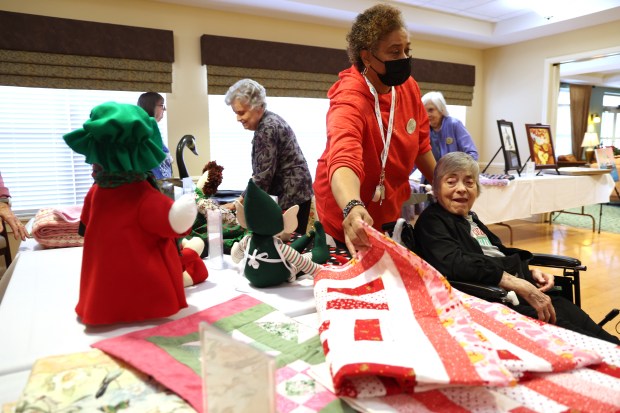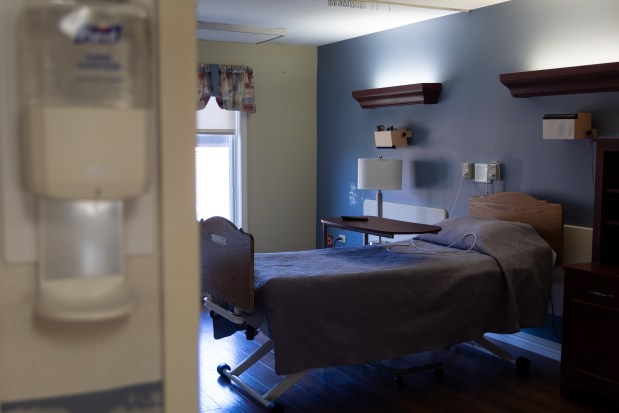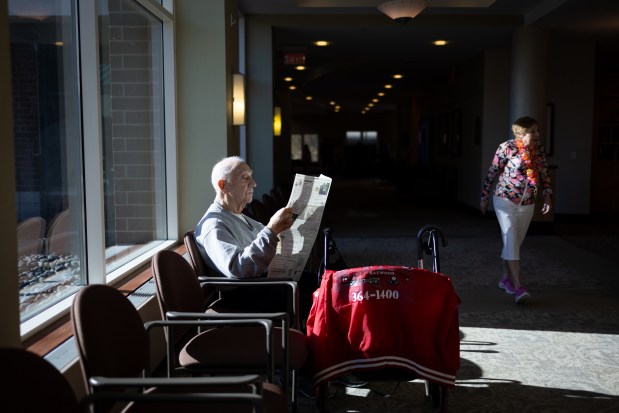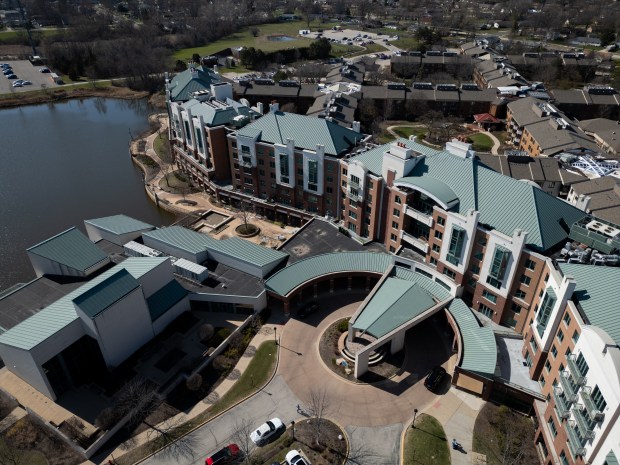A recent bankruptcy filing by a network of senior living facilities in Illinois and Indiana highlights the financial risk posed to residents who pay large entry fees to continuing care retirement communities, but get limited government protections, senior advocates say.
In February, a Lutheran not-for-profit that operates several long-term care facilities — including Lutheran Home in Arlington Heights — filed for Chapter 11 bankruptcy, seeking to continue operations while shedding debt.
The latest bankruptcy follows a Chapter 11 filing in 2023 by Schaumburg’s Friendship Village, now called Encore Village. The Oaks at Bartlett also filed for bankruptcy in 2011 and 2019, went into receivership in 2024 and was sold.
All the facilities continue to serve residents in their homes, but at Encore Village and The Oaks at Barlett, scores of residents collectively lost millions of dollars in fees they paid to get into the residences.
Officials at The Oaks at Bartlett and Lutheran Life Communities did not immediately respond to requests for comment. But Encore Village CEO Avi Satt told the Tribune, “Things are going incredibly well at the community.”
Encore switched to a rental-only model, without the high entry fees, and plans on investing $15 million in upgrades and maintenance to the building. The facility has had record growth, with 693 residents in 860 units.
“The community is in a healthy place financially today, and residents have been happy to move on from the previous negative effects of the bankruptcy,” Satt wrote.
But some families are upset about meager refunds. At the former Friendship Village, just $2 million was set aside to pay entry fee refunds owed to about 100 families.
Richard Anderson, whose father paid a $261,000 fee in 2021 to enter Friendship Village, where he still lives, was upset about the lack of prior disclosure that the facility was in dire financial straits.
He noted it is a felony to commit financial deception of a senior citizen, and questioned whether there was a “dereliction of duty” by the state to ensure proper financial disclosures. “It didn’t seem that anybody was really looking out for the current or former residents,” he said.

At The Oaks at Bartlett, Gary Krohn’s mother was among residents who collectively were owed about $3 million for the deposits they paid on their homes in the retirement community.
After her husband passed away, Krohn’s mother paid more than $250,000 as an entry fee for her home at The Oaks, with the expectation of a 90% refund after she died, but her heirs were offered just about $7,000.
“That’s pathetic,” said Krohn, whose father worked for 40 years at Caterpillar to save money for the couple’s retirement. “People were relying on this refund. Some people were irate — for good reason. This adds insult to the injury of losing a parent.”
Krohn called for state regulators to rein in such practices, and said at least part of the entry fees should be put in escrow to guarantee repayment.
Certus Living, a management company that was hired in 2023 to address the financial issues at The Oaks, published a case study showing that the facility had monthly operating losses of $150,000, and $50 million in entrance fee liabilities.
Certus said it optimized revenues by repricing services and cutting costs 10%, and restored high occupancy and positive net income.
Facilities such as The Oaks and Friendship Village are known as continuing care retirement communities, or life plan communities, where residents are promised ongoing care no matter their health status, with the guarantee that they or their heirs will get much of their money back when they leave or die. Yet more than a year after those financial failures, some residents and their descendants say they have yet to be paid.

In the latest instance, Lutheran Home is managed by Lutheran Life Communities, which also manages the life care communities of Pleasant View in Ottawa, Luther Oaks in Bloomington, and Wittenberg Village in Crown Point, all of which were part of the bankruptcy filing.
Residents generally paid entrance fees of $90,000 to $349,000 to the Lutheran Life facilities, often with the agreement that they or their heirs would be repaid 50% to 90% of the fee upon their death or departure.
But in bankruptcy, residents typically are unsecured creditors, meaning they have no ownership stake, while the investors who purchased bonds to help finance the continuing care facility are considered secured creditors. The bond holders get paid first, and other debtors get what’s left.
Illinois law requires that life care facilities keep an escrow or letter of credit equal to six months’ worth of mortgage or bond payments, but the facilities aren’t required to save enough to repay residents’ entrance fees.
Lawmakers proposed requiring such facilities to repay deposits, but backed off when retirement community operators warned such measures would jeopardize their business.
In response to the financial crises, legislators last year passed a law requiring facilities to give prospective residents the latest information on the status of potential entrance fee refunds. Refunds typically aren’t paid until a new resident takes occupancy, so the law requires disclosure of the length of time it takes to get a refund, and the number of contracts awaiting refunds.
“The new 2024 law improving presale disclosures at life care facilities in Illinois is an important step toward protecting residents,” said Philippe Largent, state director for AARP Illinois. “We encourage seniors and their families to keep sharing their experiences to ensure these protections continue to strengthen and evolve.”

The long-term care industry has faced a host of financial challenges that have intensified since the COVID pandemic, when widespread deaths among residents prompted temporary closures, which prevented new clients from moving in and caused plummeting occupancy rates
Despite significant government subsidies during COVID, inflation, labor shortages and low reimbursement rates from Medicare and Medicaid have combined to keep some facilities from recovering.
A survey of the industry by the American Health Care Association found that about half of long-term care facilities were losing money. In Illinois, 43 nursing homes have closed since 2019, and 60 skilled nursing homes have reduced their size, the Health Care Council of Illinois reported.
“The cost of care has escalated dramatically over the last five years,” senior policy director Ron Nunziato said. “It’s a tough business to figure out where to cut costs without affecting residents. These facilities are still in rebuild mode.”
Lutheran Life President and CEO M. Sloan Bentley wrote a lengthy declaration in his organization’s bankruptcy filing in February describing the situation.
Lutheran Home was founded in 1892 by a Lutheran pastor who wanted to create a homelike setting for older adults.
With rising costs and fallen revenues, the facilities’ total bond debt reached $189 million this year, plus more than $40 million for entry fee refunds that haven’t been triggered yet because of residency agreements. Yet the bankruptcy petition listed only $1 million to $10 million in current liabilities, and $10 million to $50 million in assets.
Because of the financial uncertainty, Lutheran Life is offering prospective residents the option to hold their entrance fees in an escrow account until they take permanent residency. Normally the fees are used to pay debt and operating expenses, and generate investment income.
Lutheran Life’s priorities will be to ensure that residents’ access to services is not disrupted and to maximize the value of the business, Bentley told the court.

Nationwide, fewer than 1% of life plan communities have filed for bankruptcy, according to industry association LeadingAge.
Illinois has extensive laws and regulations governing life plan communities, including requiring annual financial reports from each facility — though records don’t show The Oaks and Friendship Village filed such plans every year.
The Illinois Department of Public Health is charged with monitoring the finances of facilities that issue life care contracts. “We take this responsibility seriously,” spokesman Mike Claffey told the Tribune.
In the case of The Oaks, the agency took initial action to suspend the authorization of the facility to enter into new life care contracts in April 2024. Friendship Village filed for bankruptcy before the department took action and now is under new ownership.
In response to complaints that some families had to wait years for their units to be resold to get refunds, state Rep. Michelle Mussman, a Democrat whose northwest suburban district includes Encore Village, introduced a bill to require refunds be paid in order of those leaving. But the bill went nowhere after industry officials said it would hurt their operations.
Angela Schnepf, CEO of LeadingAge Illinois, an association of senior service providers, said most proposed legislative solutions would result in more strain on life plan communities and their residents.
“Historically, Life Plan Communities have been financially strong with the highest resident satisfaction ratings in Illinois and across the nation,” Schnepf wrote to the Tribune. “CCRCs/Life Plan Communities as a whole are rebounding from the devastating impacts of Covid-19.”
In contrast, skilled nursing homes in particular are facing financial pressure due to low Medicaid reimbursement, and some have closed across the state, Schnepf emphasized. One of the nation’s largest nursing home operators, Peoria-based Petersen Health Care, entered bankruptcy and was forced to sell most of its properties last year to Skokie-based Cascade Capital Partners.
Schnepf did express support for one change: “We believe federal bankruptcy courts should offer similar protections to residents as provided to bond holders.”



